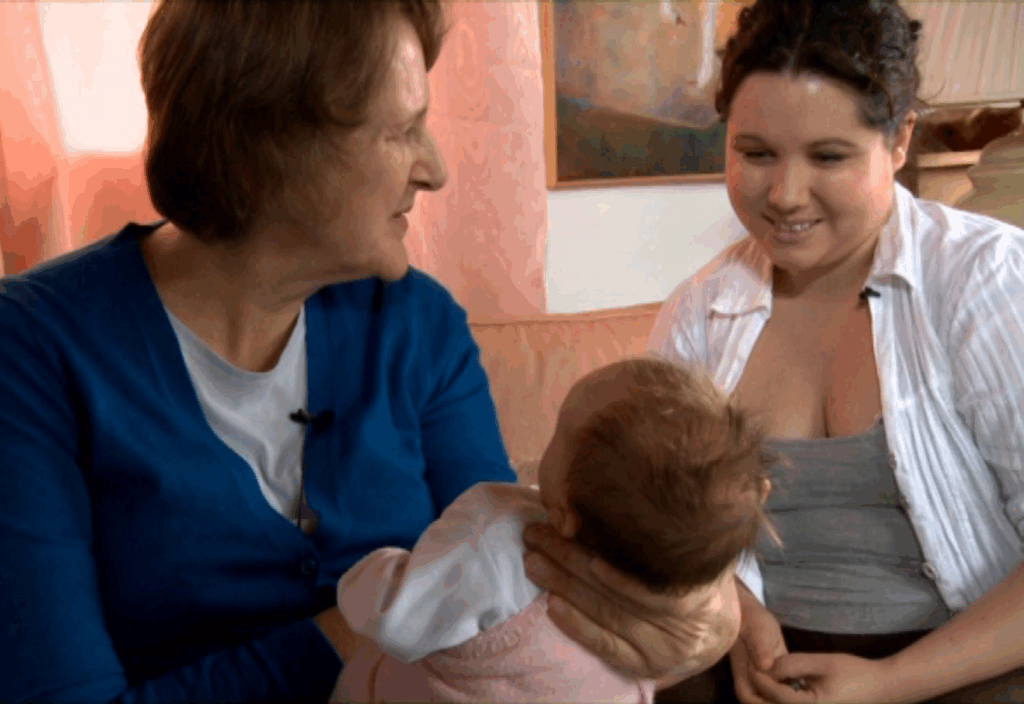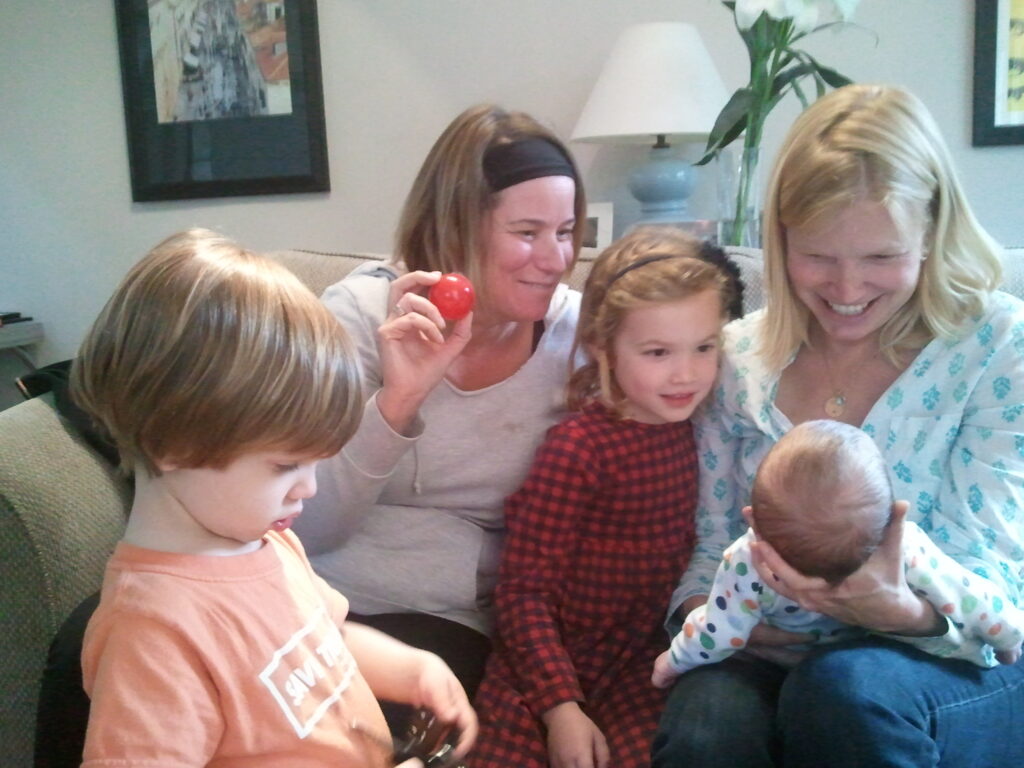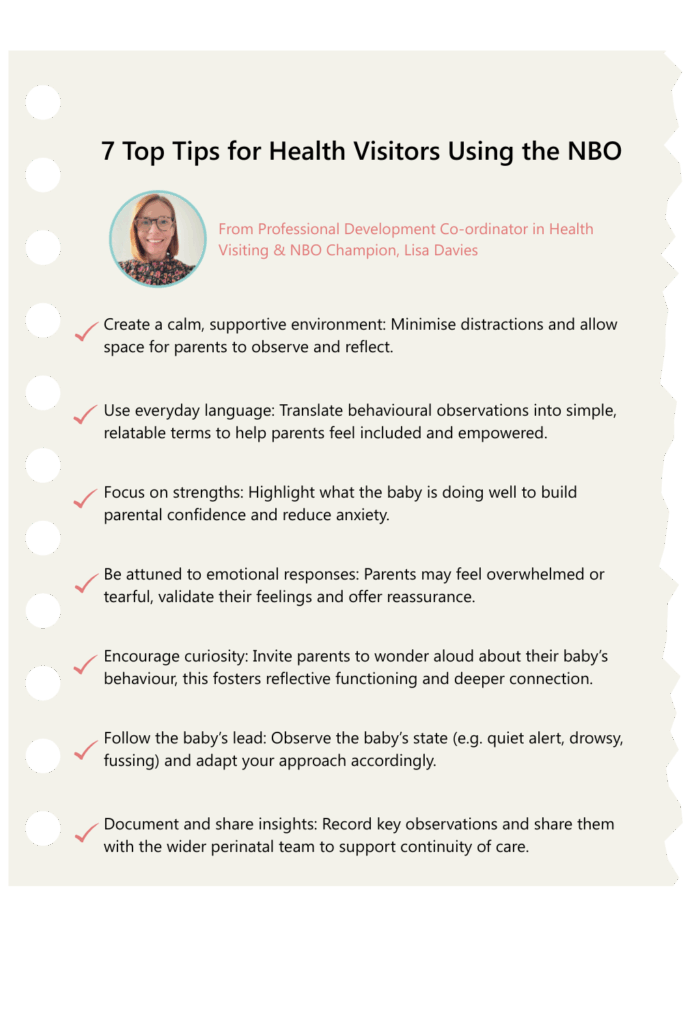
By Lisa Davies, Professional Development Co-ordinator in Health Visiting & NBO Champion – Hywel Dda University Health Board

In the delicate early days of a baby’s life, every moment holds the potential to shape lifelong relationships. During my time as a Perinatal Specialist Health Visitor working within the rural counties of West Wales, I had the privilege of walking alongside families during this transformative period. Covering a geographically large and mostly rural area, West Wales represents one of Wales most sparsely populated regions. Families here often face distinct challenges, including limited access to services and transport, poor housing quality, economic hardship, disparities in education and the long-term effects of obesity. These factors can significantly impact family wellbeing and early relational development.
One of the most powerful tools I use to support and strengthen early bonds in this context is the Newborn Behavioural Observations (NBO), a gentle, affirming approach that celebrates the unique connection between parent and child.
The Heart of the NBO: Understanding Through Connection
The NBO is more than a clinical tool, it’s a relational experience. Rooted in the pioneering work of Dr. T. Berry Brazelton, the NBO invites parents to see their baby not just as a tiny being, but as a communicator with preferences, needs, and strengths. Through 18 observable behaviours, ranging from how a baby responds to light and sound, to their ability to self-soothe and engage socially, parents begin to “read” their baby’s cues with growing confidence.
These observations are shared in real time, creating moments of wonder and insight. A baby turning toward a familiar voice, calming after a gentle touch, or focusing intently during a quiet alert state, each interaction becomes a building block for trust, attunement, and emotional connection.


Building Confidence, One Observation at a Time
In our perinatal health visiting practice, the NBO is seamlessly woven into home visits and early postnatal contacts. It offers a compassionate, non-intrusive way to:
- Empower parents to understand and respond to their baby’s needs
- Foster emotional wellbeing in both parent and infant
- Strengthen the parent-infant bond, especially in families facing anxiety, low mood, or early relational challenges
- Identify and support early signs of regulatory or relational difficulties
For many parents, especially first-time mums and dads, the NBO becomes a turning point. It transforms uncertainty into confidence, and worry into connection. It’s not uncommon to see a parent’s face light up with joy and relief when they realise, “I understand my baby, and they understand me.”
One memorable case involved a first-time mother who was struggling to connect with her newborn. During the initial home visit, there were signs of emotional distance, she was quiet, hesitant to hold her baby for long, and unsure of how to interpret his cues. We completed the Postnatal Bonding Questionnaire (PBQ), which confirmed that the bond was compromised. As part of our bonding pathway, I introduced the Newborn Behavioural Observations (NBO) as a gentle way to explore her baby’s behaviours and build confidence. She agreed she would like further support.
On our second visit, we completed the NBO together. As we observed her baby’s responses to light, sound, and touch, something shifted. When he turned toward her voice, her eyes welled up. “He really does know me,” she whispered. That moment was powerful; it marked the beginning of a connection. The NBO gave her a new lens through which to see her baby not as a mystery, but as a responsive, communicative little person.
By the third visit, we reflected on the journey. She shared how she now felt more confident and attuned to her baby’s needs. Her PBQ scores had improved, and she spoke with warmth and pride. The combination of NBO and PBQ had helped illuminate her baby’s strengths and validate her own instincts. It was a bonding pathway, one that transformed uncertainty into trust, and observation into love.

In the Flying Start areas across the three counties of West Wales, several health visitors have been trained in the NBO thanks to Welsh Government funding. However, NBO is not yet fully integrated across all areas, and expanding access remains a key priority. The potential for NBO to support families in rural and socio-economically challenged communities is immense, offering a framework for connection and resilience where traditional services may be harder to reach.
Supporting the Dyad: A Relationship That Shapes a Lifetime
The NBO is especially powerful in nurturing the dyadic relationship – the emotional and behavioural dance between parent and infant. When parents witness their baby’s ability to engage, regulate, and communicate, it fosters a sense of competence and emotional closeness. These moments lay the foundation for secure attachment, emotional resilience, and healthy development.
In my practice, I’ve seen how NBO sessions can:
- Reduce parental stress and increase confidence
- Improve responsiveness and sensitivity
- Strengthen emotional bonds
- Support recovery from perinatal mental health challenges
A New Chapter: Championing the NBO Across the Health Board
Now, in my new role as Professional Development Co-ordinator and NBO Champion, I’m deeply committed to embedding the NBO into the very heart of health visiting practice across West Wales.
This isn’t just about training – it’s about transformation.
I’m developing bitesize learning sessions that bring the NBO to life for health visitors, helping them see the power of baby states and behaviours as windows into the infant’s emotional world. Through these sessions, I aim to spark curiosity, build confidence, and inspire practitioners to use the NBO not just as a tool, but as a way of being with families.
NBO principles are also weaved into our Health Visitor Observation Assessment of Infant (HOAI) training, ensuring that understanding baby states, behaviours, and relational cues becomes a core part of our assessment and support process. By embedding this knowledge early, we can nurture stronger, more attuned relationships from the very beginning.
This work is driven by passion, by the belief that every baby deserves to be seen, heard, and understood, and that every parent deserves to feel confident, connected, and supported.
By incorporating the NBO into all health visiting services across the region, there is substantial opportunity to support families living in geographically isolated and economically disadvantaged communities, fostering healthier futures for children and families throughout West Wales.
Future Hopes:
ATTUNE is a simple, memorable acronym that communicates our future hopes for the NBO. It turns our ambitions into a practical, easy-to-use roadmap for embedding relational care across services and supporting families from the earliest days.
A – Access: Scale the NBO from a single practice into a system-wide culture of relational care by ensuring universal access to NBO-informed contacts so every family benefits from relational observation and feedback.
T – Training: Embed NBO into core training for health visitors, so relational observation becomes standard practice.
T – Teams: Build integrated, rapid referral pathways linking NBO observations to perinatal mental health, parenting programmes, and community resources.
U – Use data: Collect anonymised outcome data and partner on research to demonstrate impact, secure investment, and drive continuous improvement.
N – Nurture practice: Create peer-supported communities of practice and protect reflective supervision time to sustain practitioner skill, curiosity, and wellbeing.
E – Engage: Continue to use NBO accessible family-centred resources, adapt communications for cultural and linguistic inclusion, and raise public and partner awareness of parent–infant attunement.

Conclusion: A Gentle Revolution in Perinatal Care
The NBO is not just an assessment, it’s a celebration of the parent-infant relationship. It brings light to the subtle, beautiful ways babies communicate and invites parents into a deeper, more confident connection with their child. In our perinatal team, and now across the wider health board, it’s becoming a cornerstone of compassionate, evidence-based care. Together, we’re building a culture that honours the emotional journey of parenting and supports families in laying strong, loving foundations from the very beginning.



